Advertisement

African leaders plan ‘peace mission’ to Russia and Ukraine.
South Africa’s president said officials from six nations would visit Kyiv and Moscow as part of the initiative. The time frame remained unclear.
- Share full article

By Lynsey Chutel
- May 16, 2023
JOHANNESBURG — As South Africa faces increasing pressure over its close ties to Russia, the country’s president, Cyril Ramaphosa, said on Tuesday that leaders from six African countries would visit Moscow and Kyiv on a “peace mission” in a bid to end the war in Ukraine.
Mr. Ramaphosa said both President Vladimir V. Putin of Russia and President Volodymyr Zelensky of Ukraine welcomed the initiative — which includes Egypt, Zambia, Senegal, Uganda and the Republic of Congo — in separate phone calls over the weekend. Mr. Ramaphosa’s announcement makes South Africa the latest in a string of outsiders aiming to step in as a mediator. An envoy from China, Li Hui, the government’s special representative for Eurasian affairs, is expected in Ukraine and Russia this week in an attempt to help negotiate an end to the war. And Pope Francis has said the Vatican was involved in a secret “mission” to establish peace.
Mr. Zelensky and Mr. Putin did not immediately comment or confirm Mr. Ramaphosa’s statements, and the time frame for the visits was still unclear. Mr. Zelensky has made clear that he would reject any calls for peace talks that do not include a demand that the Russian military first withdraw from all of Ukraine’s territory. Mr. Putin has shown no signs of wanting to make concessions.
Tensions between the United States and South Africa, which has officially said it would not take sides in the conflict, have escalated in recent days. Last week, the United States ambassador to South Africa accused the government of providing weapons and ammunition via a sanctioned Russian ship that was allowed to dock in a South African naval base last December. South African officials have denied the allegations and appointed a judge to investigate the incident.
“The conflict in that part of the world, much as it does not affect Africa directly in the form of deaths and destruction to our infrastructure, it does have an impact on many Africans,” Mr. Ramaphosa told journalists during a joint media briefing with the visiting Singaporean prime minister, Lee Hsien Loong, in Cape Town. The war has led to food insecurity in Africa, with the price of fertilizers and fuel going up, he added.
Mr. Ramaphosa wrote in his weekly newsletter on Monday that the war in Ukraine had brought “extraordinary pressure on the country to abandon its non-aligned position and take sides in what is in effect a contest between Russia and the West.”
South Africa in February hosted a naval drill with Russia and China and allowed two sanctioned Russian vessels to use its military facilities. This week, South Africa’s Army chief visited Moscow for a bilateral meeting with his Russian counterpart.
South African officials have also had to face questions over whether they will honor an arrest warrant issued by the International Criminal Court to apprehend Mr. Putin if he attends a meeting of BRICS nations — Brazil, Russia, India, China and South Africa — that will be held in South Africa in August.
The issue has triggered a public debate over South Africa’s membership in the court, pitting the governing African National Congress’ historic ties with Russia against the country’s economic ties with the United States and Europe.
Lynsey Chutel covers Southern Africa from the Johannesburg bureau and also writes about Africa for The Times's international morning newsletters. She previously worked for Foreign Policy, Quartz and the Associated Press. More about Lynsey Chutel
- Work & Careers
- Life & Arts
- Currently reading: African leaders tell Putin to show his ‘desire for peace’
- Jens Stoltenberg vows Nato will stand with Ukraine for ‘as long as it takes’
- How the Ukraine war has divided the world
- Arming Ukraine: how war forced the EU to rewrite defence policy
- Biden vows ‘unwavering support’ for Ukraine during surprise visit to Kyiv
- Military briefing: how the UK took a vanguard role on arms for Ukraine
- Bad blood between Hungary and Ukraine undermines EU unity on Russia
African leaders tell Putin to show his ‘desire for peace’

- African leaders tell Putin to show his ‘desire for peace’ on x (opens in a new window)
- African leaders tell Putin to show his ‘desire for peace’ on facebook (opens in a new window)
- African leaders tell Putin to show his ‘desire for peace’ on linkedin (opens in a new window)
- African leaders tell Putin to show his ‘desire for peace’ on whatsapp (opens in a new window)
Aanu Adeoye in Dakar
Roula Khalaf, Editor of the FT, selects her favourite stories in this weekly newsletter.
African leaders told Vladimir Putin to “show his desire to move forward [with peace]” before they convene in St Petersburg for a Russia-Africa summit at the end of this month, according to Senegal’s president Macky Sall.
The demand was delivered to the Russian president during a six-nation peace mission to Kyiv and Moscow in June, Sall said in an interview with the Financial Times. Sall was joined on the trip by his counterparts from South Africa, Zambia and representatives from Uganda, Egypt, Republic of Congo and the African Union.
“Before the next Russia-Africa summit, he [Putin] must do some actions to show his desire to move forward [with peace] even in a humanitarian way,” Sall told the FT in the presidential palace in Dakar, the Senegalese capital.
He said further exchanges of prisoners of war and the return to Ukraine of children taken by Russian occupiers “can be a very good signal”.
“That’s why we continue to use the Russia-Africa summit to see how we can move forward on the negotiations we tried to implement between Russia and Ukraine.”
Asked if Putin had shown any inclination to pursue peace, Sall said: “During this summit maybe we can have another meeting and have some progress. That’s what we hope.”
African leaders have been stepping up attempts to mediate between Kyiv and Moscow with no end in sight to Russia’s war against Ukraine. African countries have been hit hard by soaring inflation caused by elevated levels of food and energy prices caused by the war. They are among the biggest importers of grain and fertiliser from Ukraine and Russia.
Although there are no western sanctions against Russian food and fertiliser exports, customers have complained about banks’ reluctance to process transactions.
“We are facing the consequences of this war,” Sall said. “We have big problems with our food security and agriculture. We buy fertilisers from Russia and today with the sanctions, there are difficulties paying for these goods.
“That’s why we’re talking to both parties. We know it’s very complicated but we think it was positively received. Ukraine has said Russia must leave its occupied territory before they can negotiate and we understand that.”
Sall was speaking in his first interview with an English language media outlet since announcing last week he would not run for what would have been a controversial third term.
There had been speculation for months over whether Sall would contest the presidential election in February. Senegal’s constitution limits presidents to two terms. But Sall’s allies had argued that a 2016 amendment shortening term lengths from seven to five years would have allowed him to run for a second five-year stint since his first seven years from 2012 to 2019 would not count.
Sall insisted he had the right to run again as one term of seven years and another of five “makes no sense”. He claimed the constitutional court had been “clear” since 2016 that his first term of seven years would not bar him from another run since that was under a different law.
But he said that, despite many Senegalese urging him to run again, he had promised in a 2018 book Le Sénégal au cœur that this would be his final term.
“Keeping one’s word is very important since the constitution gives me the right to serve a second five-year term. But since I’ve already said that I won’t do it, I believe that keeping my word is essential.”
Sall’s critics say he should have announced he was stepping down sooner. Seventy-nine per cent of Senegalese citizens support a two-term limit, according to pollster Afrobarometer. Sall says if he had announced earlier, he would have become a “lame duck” president.
At least 23 people were killed in protests last month after opposition leader Ousmane Sonko was convicted of “corrupting youth” following a trial on rape and death threat charges. A beauty parlour employee alleged that Sonko had assaulted her.
Sonko’s candidacy is in doubt as the law in Senegal bars convicts from running for political office. Sonko and his supporters have accused the government of weaponising the justice system to prevent him from contesting the election.
Sall refused to be drawn on Sonko’s political future, saying only the constitutional court could decide presidential candidates. But at a time of democratic backsliding in west Africa and with the Sahel region south of the Sahara under threat from Islamist terrorism and extremist groups, Senegal needed to focus on protecting its democracy, he said.
“We have very big problems in west Africa. But we have to focus. We also need to regulate democracy. How we can put away the coups d’etat and non-constitutional attempts to take power. It’s not only the military.
“There are people who know that they cannot get to power. So they use the youths and put them on the streets and strike and burn and create chaos. Many people think this is the way to get power by revolution. It is the same as a coup d’etat. It is even worse.”
Asked whether he was accusing Sonko of using popular unrest to seize power, Sall said: “I’m talking about no one. I’m talking about principles. I’m on another level. What we want is for Senegal to continue to develop under democracy and the rule of law.”
Promoted Content
Explore the series.

Follow the topics in this article
- African politics Add to myFT
- War in Ukraine Add to myFT
- Macky Sall Add to myFT
- Africa Add to myFT
- Senegal Add to myFT
- Skip to main content
- Keyboard shortcuts for audio player
African leaders leave Russia summit without grain deal or path to peace in Ukraine
The Associated Press

Russian President Vladimir Putin is seen on a phone screen as he attends a joint statement with President of Comoros Azali Assoumani at the Russia Africa Summit in St. Petersburg, Russia, Friday, July 28, 2023. Pavel Bednyakov/AP hide caption
Russian President Vladimir Putin is seen on a phone screen as he attends a joint statement with President of Comoros Azali Assoumani at the Russia Africa Summit in St. Petersburg, Russia, Friday, July 28, 2023.
NAIROBI, Kenya — African leaders are leaving two days of meetings with Russian President Vladimir Putin with little to show for their requests to resume a deal that kept grain flowing from Ukraine and to find a path to end the war there.
Putin in a press conference late Saturday following the Russia-Africa summit said Russia's termination of the grain deal earlier this month caused a rise in grain prices that benefits Russian companies. He added that Moscow would share some of those revenues with the "poorest nations."
That commitment, with no details, follows Putin's promise to start shipping 25,000 to 50,000 tons of grain for free to each of six African nations in the next three to four months — an amount dwarfed by the 725,000 tons shipped by the U.N. World Food Program to several hungry countries, African and otherwise, under the grain deal. Russia plans to send the free grain to Burkina Faso, Zimbabwe, Mali, Somalia, Eritrea and Central African Republic.
Fewer than 20 of Africa's 54 heads of state or government attended the Russia summit, while 43 attended the previous gathering in 2019, reflecting concerns over Russia's invasion of Ukraine even as Moscow seeks more allies on the African continent of 1.3 billion people. Putin praised Africa as a rising center of power in the world, while the Kremlin blamed "outrageous" Western pressure for discouraging some African countries from showing up.
Isolated by the West, Putin hosted a summit for leaders from Africa in St. Petersburg
The presidents of Egypt and South Africa were among the most outspoken on the need to resume the grain deal.
"We would like the Black Sea initiative to be implemented and that the Black Sea should be open," South African President Cyril Ramaphosa said. "We are not here to plead for donations for the African continent."
Putin also said Russia would analyze African leaders' peace proposal for Ukraine, whose details have not been publicly shared. But the Russian leader asked: "Why do you ask us to pause fire? We can't pause fire while we're being attacked."
The next significant step in peace efforts instead appears to be a Ukrainian-organized peace summit hosted by Saudi Arabia in August. Russia is not invited.
Africa's nations make up the largest voting bloc at the United Nations and have been more divided than any other region on General Assembly resolutions criticizing Russia's actions in Ukraine. Delegations at the summit in St. Petersburg roamed exhibits of weapons, a reminder of Russia's role as the top arms supplier to the African continent.
Putin in his remarks on Saturday also downplayed his absence from the BRICS economic summit in South Africa next month amid a controversy over an arrest warrant issued against him by the International Criminal Court. His presence there, Putin said, is not "more important than my presence here, in Russia."

Associated Press Associated Press
Leave your feedback
- Copy URL https://www.pbs.org/newshour/world/african-leaders-arrive-in-russia-for-summit-as-putin-seeks-allies
African leaders arrive in Russia for summit as Putin seeks allies
ST. PETERSBURG, Russia (AP) — Some African leaders arrived in Russia on Wednesday for a summit with President Vladimir Putin as the Kremlin seeks more allies amid the fighting in Ukraine.
Putin has billed the two-day summit that opens Thursday in St. Petersburg as a major event that would help bolster ties with a continent of 1.3 billion people that is increasingly assertive on the global stage.
On Wednesday, Putin held one-on-one talks with Ethiopia’s Prime Minister Abiy Ahmed, and said Russia will more than triple the number of Ethiopian students it hosts and cover their education costs.
Ethiopia’s government has been under pressure from the U.S. and the World Food Program after they made the extraordinary decision to suspend food aid to the country earlier this year following the discovery of massive theft of aid. They seek reforms that involve the government giving up controls over aid distribution. Meanwhile, watchdogs say hunger is rising in areas like the Tigray region that is recovering from two years of conflict.
Later in the day, Putin is set to meet with Egyptian President Abdel Fattah el-Sissi.
Africa’s 54 nations make up the largest voting bloc at the United Nations and have been more divided than any other region on General Assembly resolutions criticizing Russia’s actions in Ukraine.
It’s the second Russia-Africa summit since 2019. The number of heads of states attending shrank from 43 then to 17 now because of what the Kremlin described as a crude Western pressure to discourage African nations from taking part.
Kremlin spokesman Dmitry Peskov deplored “unconcealed brazen interference by the U.S., France and other states through their diplomatic missions in African countries, and attempts to put pressure on the leadership of these countries in order to prevent their active participation in the forum.”
READ MORE: Five European countries will extend ban on Ukraine’s grain
“It’s absolutely outrageous, but it will in no way prevent the success of the summit,” Peskov said in a conference call with reporters.
Putin’s foreign affairs adviser Yuri Ushakov said that while only 17 heads of state will attend the summit, 32 other African countries will be represented by senior government officials or ambassadors.
The summit follows Russia’s withdrawal from a deal that allowed Black Sea exports, vital to many African countries, a move that drew a strong condemnation around the world and raised new threats to global food security.
Russia shrugged off criticism and doubled down by launching a barrage of missile attacks on Ukrainian ports and agriculture facilities.
At the same time, Putin has repeatedly pledged that Russia would offer free grain to low-income African countries now that the Black Sea deal has been terminated.
“I want to give assurances that our country is capable of replacing the Ukrainian grain both on a commercial and free-of-charge basis,” Putin said in a statement Monday, asserting that Russia shipped almost 10 million tons of grain to Africa in the first half of the year.
Along with grain, another issue likely to be on the agenda will be the fate of Russia’s Wagner military company led by Yevgeny Prigozhin following its brief rebellion against the Kremlin last month. Wagner’s future will be an urgent issue for countries like Sudan, Mali and others who contract with the mercenary group in exchange for natural resources like gold. Russian officials and Prigozhin have said the company will continue working in Africa.
A peace proposal for Ukraine that African leaders have tried to pursue is set to be discussed as well.
“The summit background will also offer an opportunity to African heads of state who are part of the African Leaders Peace Mission to continue talks with President Putin on the confidence-building measures that will create conducive conditions for a path to peace between Russia and Ukraine,” a statement from the South African presidency said Wednesday.
Cara Anna in Nairobi, Kenya contributed to this report.
Support Provided By: Learn more
Educate your inbox
Subscribe to Here’s the Deal, our politics newsletter for analysis you won’t find anywhere else.
Thank you. Please check your inbox to confirm.

Inside Ukraine’s counteroffensive as forces step up grueling fight against Russia
World Jul 25
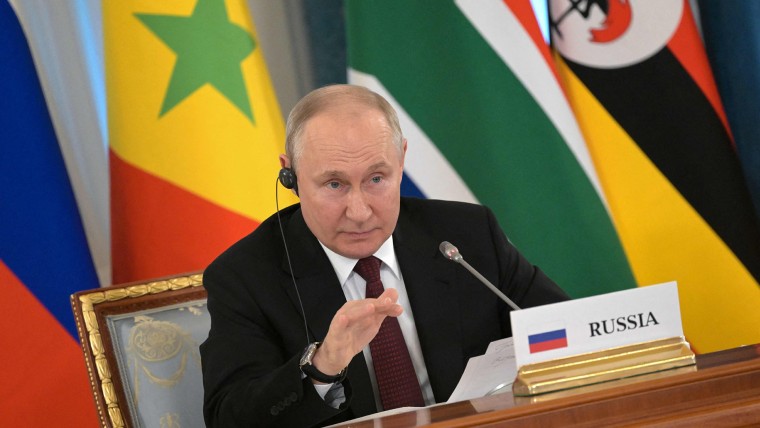
Biden expected to make one of his final major speeches at UN
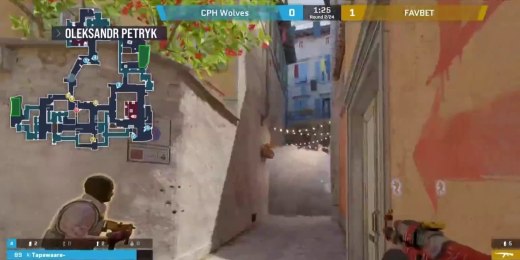
Information war rages between Russia and Ukraine in online gaming platforms
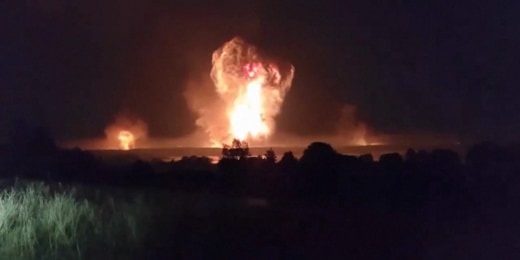
WATCH: Huge explosion at Russian missile facility after Ukrainian drone attack
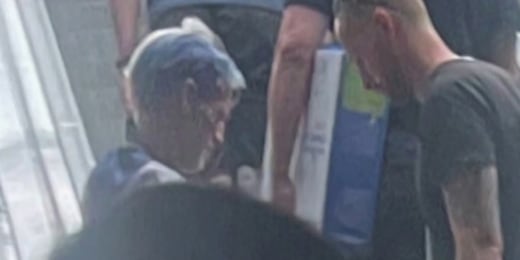
Ellison Barber describes her interactions with Trump suspect while stationed in Ukraine
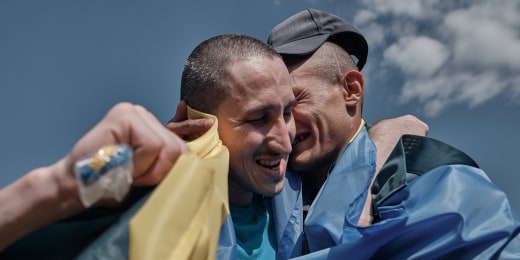
Russia and Ukraine exchange 206 prisoners of war
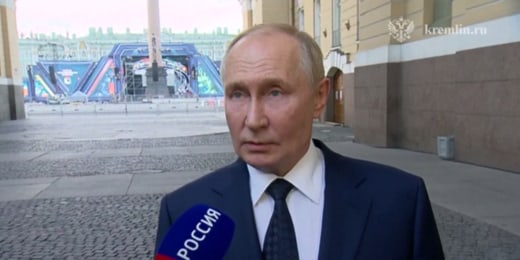
Putin warns the West not to allow Ukraine to target Russia with long-range weapons
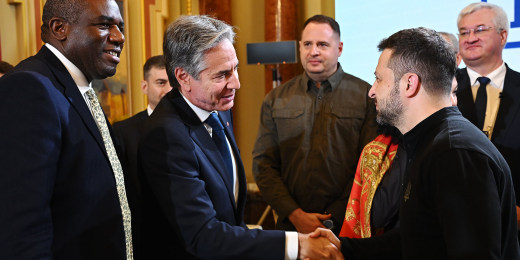
Blinken travels to Kyiv to show support for Ukraine

Video appears to show Ukrainian dragon drones in combat
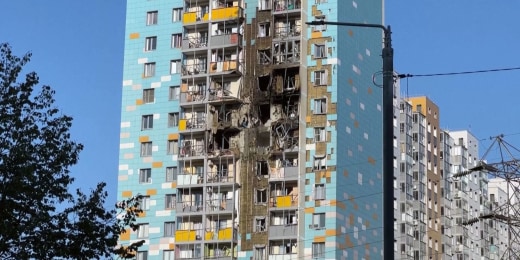
Russian officials say they shot down 15 drones attacking the Moscow region
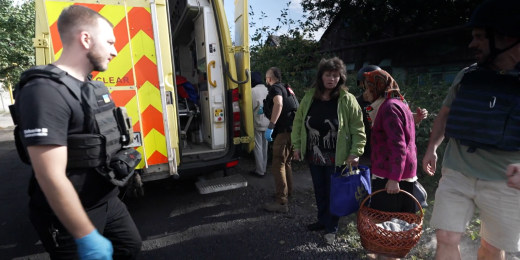
Ukrainian civilians are evacuated as Russian military closes in on Pokrovsk
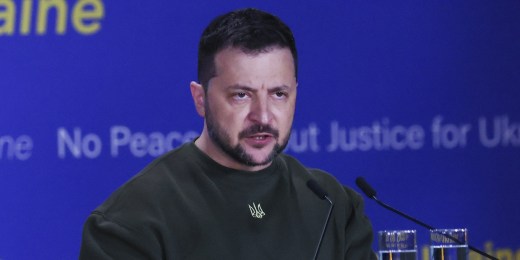
Zelenskyy on captured Russian territory: ‘ We don’t need their land’
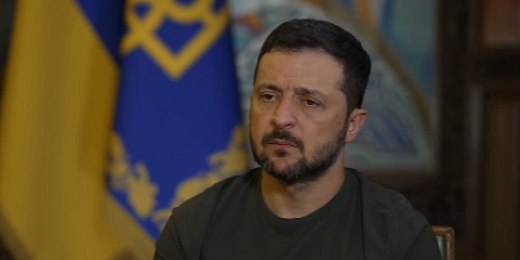
Zelenskyy vows victory after ‘pre-emptive strike’ in Russia’s Kursk region
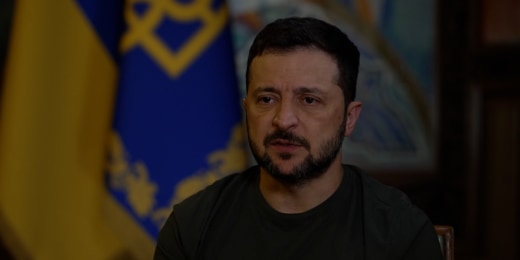
'Another tragedy in Ukraine': Zelenskyy speaks about Russian strike in Poltava
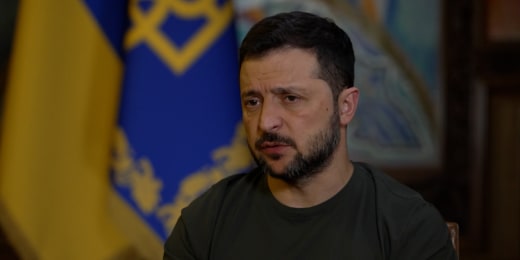
Zelenskyy says Ukraine plans to hold its seized Russian territory
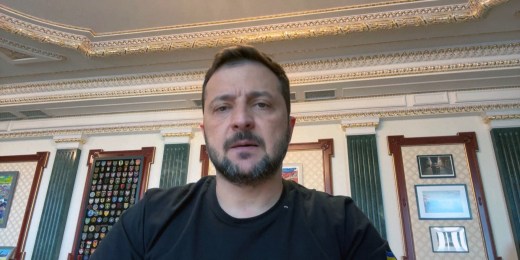
Zelenskyy speaks after Russian missile strike kills at least 41 people in Ukraine
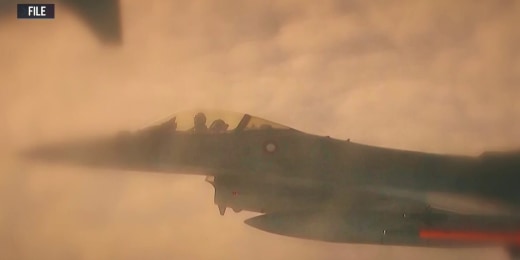
Ukrainian F-16 crashes during Russian missile attack
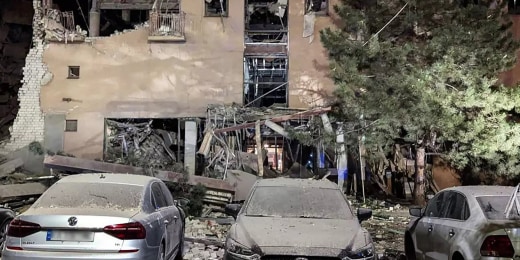
Russia escalates airstrikes on Ukraine after bombing its power grid
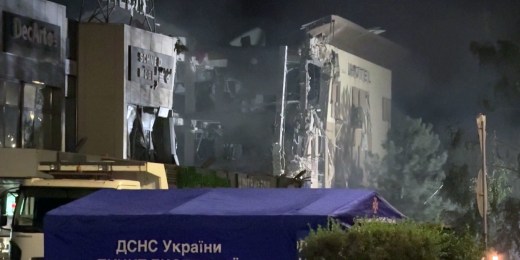
Russian missile strike kills at least 2 in in Ukrainian city of Kryvyi Rih
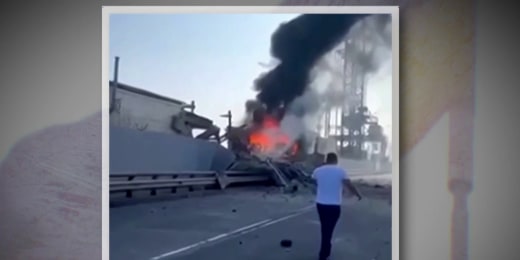

Russia launches major barrage on Ukraine, killing at least 4
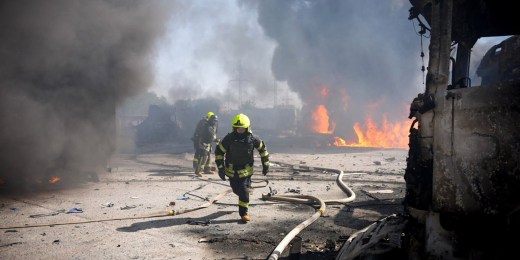
Russia launches attack against Ukraine’s energy infrastructure
African leaders tell putin war ‘must end’ during ukraine peace talks.
A group of leaders from seven African countries met with Russian President Vladimir Putin to discuss their Ukraine peace plan, a day after meeting with Ukrainian President Volodymyr Zelenskyy in Kyiv. June 17, 2023
Best of NBC News

Nightly News Netcast
Nightly news full broadcast (september 22nd).

Nightly News
High school football player surprises teammates with special gift.

Behind-the-scenes look at NFL's facial authentication technology

A behind-the-scenes look at security preps for the UN General Assembly

Newly-released body camera footage shows an officer-involved shooting in the NYC subway

Donald Trump campaigns in battleground North Carolina
Zelenskyy asks African leaders to push Russia on prisoner release
The delegation began their ‘peace mission’ in Ukraine and plan to visit Russia and meet President Putin on Saturday.
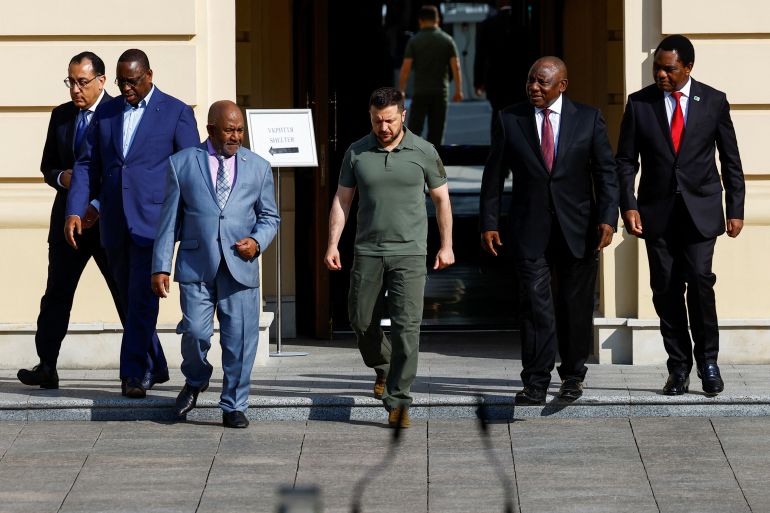
Ukrainian President Volodymyr Zelenskyy urged a group of African leaders to ask his Russian counterpart Vladimir Putin to free political prisoners from Crimea and beyond, saying it would be an “important step” during their trip to Russia on Saturday.
Seven African leaders – the presidents of Comoros, Senegal, South Africa and Zambia, as well as Egypt’s prime minister and top envoys from the Republic of Congo and Uganda – visited Ukraine on Friday as part of a self-styled “peace mission” to both Ukraine and Russia to try to help end their nearly 16-month-old war.
On Saturday, the African leaders will travel to meet Putin in the Russian city of St Petersburg.
The mission to Ukraine, the first of its kind by African leaders, comes in the wake of other peace initiatives such as one by China.

“This conflict is affecting Africa negatively,” South African President Cyril Ramaphosa said at a news conference alongside Zelenskyy and the four other African heads of state or government, after the leaders met for closed-door talks on Friday afternoon.
The trip is seen as a crucial one as many African nations, to varying degrees, rely on food and fertiliser deliveries from Russia and Ukraine, whose war has jeopardised and impeded exports from one of the world’s most important breadbaskets.
“I do believe that Ukrainians feel that they must fight and not give up. The road to peace is very hard,” Ramaphosa added.
“Today, we even told President Zelenskyy that we not only recognise their [Ukrainians’] viewpoint, but we also respect how they feel about the war that’s going on. But we also said there is a need to bring this conflict to an end sooner rather than later.”
Zelenskyy told reporters after the meeting with the delegation of African leaders, “I clearly said several times at our meeting that to allow any negotiations with Russia now that the occupier is on our land is to freeze the war, to freeze pain and suffering.”
He also said that peace talks with Russia would be possible only after Moscow withdraws its forces from occupied Ukrainian territory.
“We need real peace, and therefore, a real withdrawal of Russian troops from our entire independent land.”
‘Liberate prisoners’
The mood of the news conference became tense when Comoros President Azali Assoumani floated the idea of a “road map” to peace, prompting questions from Zelenskyy who sought a clarification and insisted he did not want “any surprises” from their visit with Putin.
Zelenskyy then urged them to help free political prisoners from Crimea , which Russia illegally annexed in 2014.
“Would you please ask Russia to liberate the political prisoners?” Zelenskyy said. “Maybe this will be an important result of your mission, of your ‘road map’.”
Earlier, explosions rocked Kyiv as air raid sirens blared in the Ukrainian capital as the visit began.
“Putin ‘builds confidence’ by launching the largest missile attack on Kyiv in weeks, exactly amid the visit of African leaders to our capital,” Ukrainian Foreign Minister Dmytro Kuleba wrote on Twitter afterwards. “Russian missiles are a message to Africa: Russia wants more war, not peace.”
Before their meeting with Zelenskyy, the African leaders visited Bucha , a Kyiv suburb where bodies of civilians lay scattered in the streets last year after Russian troops abandoned a campaign to seize the capital and withdrew from the area.
Prospective peace plan
The peace mission could propose a series of “confidence-building measures” during initial efforts at mediation, according to a draft framework document seen by the Reuters news agency.
The document stated that the objective of the mission is “to promote the importance of peace and to encourage the parties to agree to a diplomacy-led process of negotiations”.
Its measures could include a Russian pullback, removal of tactical nuclear weapons from Belarus and suspension of the implementation of an International Criminal Court arrest warrant targeting Putin.
A ceasefire could follow and would need to be accompanied by negotiations between Russia and the West, the document stated.
Kyiv said its own plan, which envisages the withdrawal of Russian troops from Ukrainian land, must be the basis for any settlement of the war.
Diplomatic standoff
Meanwhile, a diplomatic standoff continues between South African officials and Polish authorities in Warsaw.
South Africa’s News 24 reported that the row began after a charter plane with presidential security and journalists landed in the Polish capital from Johannesburg on Thursday afternoon.
Ramaphosa, who landed on a separate flight, had to travel to Kyiv by train with an unknown number of security personnel even as the plane is reportedly still stuck in Warsaw.
“A second charter plane that was apparently supposed to take the security team to a rendezvous with the president in the south of Poland before he travelled to Kyiv never arrived to pick up the South Africans upon their arrival at Warsaw’s Chopin Airport,” News 24 reported.
“It is unclear who the service provider is who was to provide the second charter plane.”
According to South African journalists at the scene, Polish authorities refused to let the South African security personnel leave the plane and threatened to confiscate 13 containers of weapons and equipment on it.
In response, General Wally Rhoode, head of Ramaphosa’s security, called a news conference on the steps of the plane.
“They are delaying us,” he said, accusing Polish authorities of “sabotage” and “racism”, according to media outlet EWN. “They’re putting the life of our president in jeopardy because we could have been in Kyiv this afternoon already.”
Africa: What Does Russia Trade With Africa?
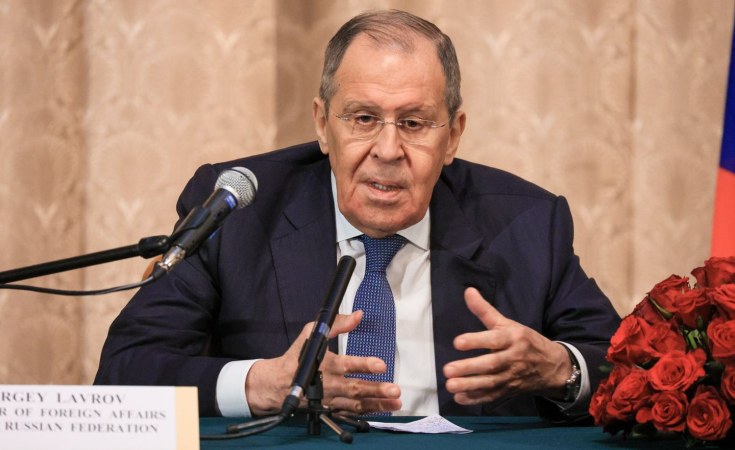
Moscow — After two symbolic African leaders' summits, Russia's trading is steadily increasing but significantly in exports of military weapons and equipment. According to Kremlin reports, Russian President Vladimir Putin said the trade turnover between Russia and African countries had increased by almost 35% in the first half of 2023 despite international sanctions.
During the first summit, Putin promised to double trade with African states within five years as he sought to win new friends with offers of nuclear power plants and fighter jets. He fixed the expected figure at $40 billion, which he repeated in several speeches until the last summit held in July 2023 in St. Petersburg.
According to the Russia Today (RT) report, under the headline "Russia expanding African defence partnerships" issued 5th Sept. 2024, Russia's arms exporter Rosoboronexport has outlined plans for joint ventures regarding military equipment with the continent. That report indicated that the Russian arms export agency Rosoboronexport has been advancing multiple cooperation projects with African countries, quoted Aleksandr Mikheev, the agency's head.
Mikheev, speaking on the sidelines of the Egypt International Airshow, further said his agency was working on several industrial cooperation projects with African countries, focusing on the licensed production of small arms, ammunition, armoured vehicles, and fast combat boats.
The head of the Russian arms export agency also noted the increasing importance of Africa and the Middle East in the company's overall business. "The combined share of Middle Eastern and African countries in Rosoboronexport's order portfolio exceeds 50%, which translates to over $25 billion," he said.
Mikheev revealed that over 40 African nations are actively engaged in military-technical collaboration with Russia. "There is a very significant share of signed and executed contracts in the order portfolio. Mostly, of course, it is equipment, air force, air defence, helicopters, small arms, electronic warfare."
Last December for instance, the Rosoboronexport head said that African countries bought more than 30% of the weapons systems exported by Russia in 2023. The Stockholm International Peace Research Institute (SIPRI) reported last year that Russia had overtaken China as the leading arms seller in sub-Saharan Africa, with market share growing to 26% as of 2022. According to the report, Algeria, Angola, Egypt, and Sudan were the top importers of Russian weapons on the continent.
Business& Financial Times also reported that Putin had promised to double trade with African states within five years as he sought to win new friends with offers of nuclear power plants and fighter jets. Moscow remains the biggest exporter of arms to Africa.
The most successful pillar of Russia's conventional trade with Africa is arms, managed mainly by state-controlled Rosoboronexport. Between 2010 and 2021 Russian arms exports to Africa dwarfed those of every other supplier and were three times greater than those of China, the second-biggest over the period, according to SIPRI.
Other Russian companies with significant operations in Africa include Alrosa, which operates diamond projects in Angola and is exploring in Zimbabwe; Rusal, which mines bauxite in Guinea; and Rosatom, which is building a nuclear power plant in Egypt.
As years move on, few of those promises have concretely materialized and yet Russian influence on the continent is growing faster than at any point since the end of the Cold War. But this trend has fallen short of the Kremlin's promise to African leaders.
African exporters are not trading in Russia's market due to multiple reasons including inadequate knowledge of trade procedures, rules and regulations as well as the existing market conditions. Until now, African entrepreneurs have struggled pathways to explore Russia's market as trade preferences also mentioned several times failed to be implemented.
Multiple challenges still grossly remain and stand in the pathways to ultimately realize the economic cooperation goals set by the two summits. Foreign Minister Sergey Lavrov plans to hold the first Foreign Ministerial Conference in November 2024 to strategize some aspects of strengthening economic cooperation between Russia and Africa.
Some experts think that the ongoing crisis between Russia and the West is stimulating Russia's leadership to look for new markets, and besides Asia-Pacific countries, Africa has become its choice. Quite recently, Russian Foreign Minister Sergey Lavrov wrote in his article: "We attach special significance to deepening our trade and investment cooperation with the African States. Russia provides African countries with extensive preferences in trade."
The minister went on: "At the same time, it is evident that the significant potential of our economic cooperation is far from being exhausted and much remains to be done so that Russian and African partners know more about each other's capacities and needs. The creation of a mechanism for the provision of public support to business interaction between Russian companies and the African continent is on the agenda."
Reports further showed that Russia has started, after the second summit in July 2023, strengthening its economic cooperation by opening trade missions with the responsibility of providing sustainable business services and plans to facilitate import-export trade in some African countries.
But these Russian trade centres can also embark on a 'Doing Business in Africa' campaign to encourage Russian businesses to take advantage of growing trade and investment opportunities, to promote trade fairs and business-to-business matchmaking in key spheres in Africa.
China, India and Russia are members of the BRICS association with the common goal of fighting against Western domination in Africa. However, the three have different distinctive individual economic interests in Africa. China entered Africa immediately after Russia created the vacuum following the Soviet's collapse, China has developed its economic tentacles across Africa.
For some time, Russia has been concerned with China's growing presence in Africa. And that points to the fact that Moscow has to step up its activities, whether between governments or private enterprises, more strategically in African countries.
Many Russian and African analysts and policy observers believe that a public-private partnership (participation) strategy in promoting trade will help significantly to polish part of the soft power image both in Russia and Africa.
According to the African Development Bank, Africa's economies are growing faster than those of any other continent. Nearly half of African countries are now classified as middle-income countries, the number of Africans living below the poverty line fell to 39 per cent in 2023 as compared to 51 per cent in 2021, and around 380 million of Africa's 1.4 billion people are now earning good incomes - rising consumerism - that makes trade profitable.
Of course, there are various ways to open the burgeoning market for Africa. One of the surest ways is to use the existing rules and regulations. The preferential tariffs for agricultural products exist but only a few African exporters use them, mainly from South Africa, Kenya, Morocco and Egypt. Russian authorities should make it possible for more individual African countries to negotiate for their products to enter the market.
The African regional economic blocs can be useful instruments for facilitating trade between Africa and Russia. In addition, the Russian Foreign Affairs Ministry posted an official report on its website that traditional products from least-developed countries (including Africa) would be exempted from import tariffs. The legislation stipulates that traditional goods are eligible for preferential customs and tariff treatment.
Most of the experts interviewed for this story expressed skepticism and wondered if Russian authorities were seriously prepared to open the market for Africa, while others suggested, that with the context of current global competition, Russian authorities have to provide trade incentives.
An academic researcher at the African Studies Institute in Moscow told me the trade preferential for only traditional African goods would really not promote a large scale trade, unfortunately, Russia's trade with Africa has mostly concentrated in weaponry and military hard-wares. Simple products such as African tea and coffee trade would face keen competition from other global brands.
As China and India are currently doing, Russia should similarly embark on trade facilitation measures, including simplifying import-export procedures (customs, warehousing and transportation) to encourage trade with African countries.
Some say it's probably both a mix of negative perception and inadequate knowledge about the emerging business potentials that might have an impact on trade development between Russia and Africa. Trade facilitation focusing on lowering the cost of doing business by minimizing regulations and procedures required to move goods and services across borders.

Sign up for free AllAfrica Newsletters
Get the latest in African news delivered straight to your inbox
By submitting above, you agree to our privacy policy .
Almost finished...
We need to confirm your email address.
To complete the process, please follow the instructions in the email we just sent you.
There was a problem processing your submission. Please try again later.
Russia can change the equation that way, and the authorities can even shift focus and transfer their technology to agriculture, and oil and gas in Africa which is booming these days. The experts believe that new trade alliances are emerging and have great potential for growth amid the economic sanctions. Russia has to capitalize on the historical connection between Moscow and those African elites who had been educated in the Soviet Union.
As it was during the Soviet times, Russia could only offer a few manufactured goods that would successfully compete with Western-made products. African nations will probably continue to acquire Russian-made arms, but otherwise, there are a few prospects for diversification of cooperation in the near future.
While Russia's trade still straddles with Africa, China and other external players are navigating the single African Continental Trade Area (AfCFTA) which offers huge opportunities, an initiative by the African Union (AU). Russia can build on the historical and time-tested friendly ties with Africa but has to review and take concrete measures to work jointly with African countries in strengthening economic and trade cooperation, an essential pillar of the multipolar world.
A complete departure away from mere rhetoric will be an encouraging step forward, and enhance economic relations between African States and the Russian Federation. With the current geopolitical situation, Russia and African countries could now use the chance to strengthen their trade relations and take further decisive actions from both sides to drive foreign policies in a more qualitative manner in this emerging multipolar world.
Kester Kenn Klomegah focuses on current geopolitical changes, foreign relations and economic development-related questions on Africa with external countries. Most of his well-resourced articles are reprinted in several reputable foreign media.
IPS UN Bureau
Follow @IPSNewsUNBureau
Read the original article on IPS .
- External Relations
- Europe and Africa
AllAfrica publishes around 500 reports a day from more than 100 news organizations and over 500 other institutions and individuals , representing a diversity of positions on every topic. We publish news and views ranging from vigorous opponents of governments to government publications and spokespersons. Publishers named above each report are responsible for their own content, which AllAfrica does not have the legal right to edit or correct.
Articles and commentaries that identify allAfrica.com as the publisher are produced or commissioned by AllAfrica . To address comments or complaints, please Contact us .
AllAfrica is a voice of, by and about Africa - aggregating, producing and distributing 500 news and information items daily from over 100 African news organizations and our own reporters to an African and global public. We operate from Cape Town, Dakar, Abuja, Johannesburg, Nairobi and Washington DC.
- Support our work
- Sign up for our newsletter
- For Advertisers

- © 2024 AllAfrica
- Privacy Policy
Trudeau urges global leaders to support pact for future at UN summit
Prime Minister Justin Trudeau delivers a speech during a plenary at the Summit of the Future at the United Nations headquarters in New York on Sept. 22. Sean Kilpatrick/The Canadian Press
Prime Minister Justin Trudeau says that at a time when the world faces increasing instability, leaders have a choice: bury their heads in the sand or put their differences aside for the sake of future generations.
“We can recognize that, collectively, we have a responsibility to set our differences aside, to confront the serious global challenges, and to deliver on a pact for the future,” Trudeau said at the Summit of the Future in New York on Sunday.
The Summit of the Future, announced by UN Secretary-General António Guterres in 2021, continues through Monday ahead of the 78th meeting of the United Nations General Assembly .
Its goal is to reform the UN, reinvigorate multilateralism and agree on solutions to new challenges at a time when the global institution has faced criticism for its handling of issues including Russia’s invasion of Ukraine and the war in Gaza.
Guterres urged member nations last week to compromise and approve the “Pact of the Future,” a blueprint to address a wide range of global challenges. But there’s been pushback from Russia, Saudi Arabia and other countries who object to some of the language on issues including climate change and reforming international financial institutions.
Trudeau urged leaders to deliver on the plan so that every generation “has a real and fair shot.
Joly convenes meeting with fellow female foreign ministers to talk about harassment, equity in politics
Opinion: In its current form, Canada’s public service can’t attract the best and the brightest
Hezbollah hits back with rockets as it declares an ‘open-ended battle’ with Israel
Trudeau was scheduled to meet Sunday with Guterres, as well as Japanese Prime Minister Fumio Kishida and Kathy Hochul, New York State’s Democratic governor.
“While diplomacy is hard and diplomacy about diplomacy is even harder, we can do hard things,” Linda Thomas-Greenfield, the U.S. ambassador to the UN, said Wednesday.
“We can think beyond what has been, push ourselves to create a system that meets this moment and the opportunities of the future.”
Thomas-Greenfield said the Biden administration supports changes to the makeup of the UN Security Council, helping it become more inclusive through creation of two permanent seats for Africans and a new elected seat for small island developing states.
Canada has been active at the United Nations since it was formed in 1945 and helped draft the UN Charter.
Trudeau, co-chair of the UN Sustainable Development Goals Advocates group, will reaffirm Canada’s commitment to its 2030 Agenda, a 15-year global framework adopted in 2015 that envisions a secure world free of poverty and hunger, with equal education and universal health coverage as well as other lofty goals.
Trudeau will also co-host a discussion with Haiti’s acting prime minister, Garry Conille, about “solutions that are Haitian-led,” a news release said.
Canada is closely invested in Haiti’s response to the ongoing humanitarian, security and political crises. A UN report released in June said surging gang activity had displaced nearly 580,000 people in the Caribbean country since March.
While at the assembly, Trudeau will also co-host an event with European Commission President Ursula von der Leyen about climate change, carbon pricing and industrial decarbonization.
Pressing geopolitical challenges and the conflict in the Middle East will cast a shadow over the assembly and its formidable future plans.
Canada abstained last week from a high-profile UN vote demanding that Israel end its “unlawful presence” in the Gaza Strip and the occupied West Bank within a year.
The State of Palestine brought the non-binding motion, which passed 124-14. Canada was among 43 abstentions. The United States voted against it.
“We cannot support a resolution where one party, the State of Israel, is held solely responsible for the conflict,” said Bob Rae, Canada’s ambassador to the UN.
Ukrainian President Volodymyr Zelensky is also set to address a special meeting of the UN Security Council on Tuesday about Russia’s ongoing invasion, Thomas-Greenfield said.
Russia has a permanent seat on the Security Council and has been resoundingly criticized over its aggression in Ukraine being a violation of the UN Charter.
“We intend to keep the pressure on Russia,” said Thomas-Greenfield.
The prime minister is attending the assembly in New York until Wednesday morning.
Later that day, the Trudeau government is expected to face its first test in the House of Commons since the NDP ended its supply and confidence deal with the Liberals.
Conservative Leader Pierre Poilievre is putting forward a motion stating the House has no confidence in the government or the prime minister. Members will vote on it Wednesday.
The New Democrats and Bloc Quebecois have said they intend to vote against the motion, avoiding a general election.
Report an editorial error
Report a technical issue
Follow related authors and topics
- Climate Change
- Federal Politics (Canada)
- International Relations and Global Issues
- Justin Trudeau
Authors and topics you follow will be added to your personal news feed in Following .
Interact with The Globe
trending now in World News

Israel probing whether Hamas leader and Oct. 7 mastermind Yahya...
Royal Caribbean quietly bans this essential travel item from its...

200-year-old message reveals note from archaeologist

Netanyahu weighs plan to evacuate all of northern Gaza, lay...

Boy, 7, denied passport for family vacation over shared name with...

Hezbollah chiefs killed in IDF airstrike were plotting Oct....

Trove of top-secret information may be trapped on $40M yacht...

Iran delivers ballistic missiles to Russia without launchers:...
Hezbollah chiefs killed in idf airstrike were plotting oct. 7-like ‘ground invasion’ of northern israel: officials.
The senior Hezbollah leaders killed in Friday’s Israel Defense Forces airstrike were meeting to plan an Oct.7-style invasion in northern Israel, officials said.
Members of the Iran-backed terror group’s elite Radwan Force were allegedly studying “plans for a ground invasion at the heart of the occupied territories” in northern Israel, a Hezbollah source told the Al-Monitor Middle East news outlet.
Israeli President Isaac Herzog reiterated the claims during a Sky News broadcast Sunday morning as he condemned Iran and its terror proxies.

“All of these leaders came together in order to launch the same horrific, horrendous attack that we had on Oct.7 by Hamas, by burning Israelis, by butchering them, raping their women, abducting and taking hostage people and little babies,” Herzog said.
“This is exactly the same plan they have been planning for years under the plans of the Empire of Evil of Iran,” he added.
The IDF said it killed 16 senior commanders and Hezbollah operatives during an airstrike on Friday as the terrorists gathered inside a high-rise apartment building in the Dahiya area of southern Beirut.
IDF spokesperson Rear Adm. Daniel Hagari said top leaders Ibrahim Aqil and Ahmed Wahbi were among those killed in the blast as they were allegedly scheming to invade Israel.
“Aqil and the Radwan Force commanders who we attacked are the commanders who drew up and led the Hezbollah terror group’s plan, to be carried out on the day the order was given, to attack into the northern territory of the State of Israel, what they called ‘The plan to conquer the Galilee,’” Hagari said.
Aqil and Wahbi were also allegedly part of Hezbollah’s top brass that allegedly oversaw the near-daily attacks on Israel since Oct. 8.

Following the airstrike, which Lebanese health officials left a total of 37 people dead, Hezbollah fired more than 100 rockets over the border early Sunday .
One of the missiles hit a residential building in Kiryat Bialik, wounding at least three people as thousands across northern Israel were sent scrambling for shelters.
In retaliation, Israel fired its own rocket barrage that killed at least three people and left another four wounded near the border, according to Lebanon’s health ministry.

The conflict between Israel and Hezbollah reached a boiling point after thousands of pagers, radios and other electronic devices used by members of the terror group detonated last week in attacks that were blamed on Israel .
Sources told Axios that the attacks were an attempt to reach “de-escalation through escalation” — forcing Hezbollah leaders to back down by hitting their leaders and fighters with destabilizing attacks.
While the US backs Israel’s right to defend itself, White House National Security spokesman John Kirby told ABC’s “This Week” that it is not in Israel’s “best interest” to force a military escalation.

“The tensions are much higher now than they were even just a few days ago,” Kirby said. “We still believe that there can be time and space for a diplomatic solution here and that’s what we’re working on.”
“We’ve been working since the beginning of this conflict, October 8th and on, to try to prevent an escalation, to prevent a broadening of this conflict there in and around Israel, but also in the region,” he added.

Advertisement

COMMENTS
World Jun 17, 2023 3:09 PM EDT. KYIV, Ukraine (AP) — Russian President Vladimir Putin on Saturday met with a group of leaders of African countries who traveled to Russia on a self-styled ...
South African President Cyril Ramaphosa has hailed as "historic" last week's trip of African leaders to Ukraine and Russia, describing it as "the first time African leaders have embarked on a ...
June 17, 2023, 8:41 PM UTC. By Associated Press. KYIV, Ukraine — Russian President Vladimir Putin on Saturday met with a group of leaders of African countries who traveled to Russia on a self ...
The African states being represented at the St. Petersburg summit will be keen to sway Russia into rejoining the grain deal, and Putin has courted African leaders for years in a deliberate effort ...
Why South Africa's Cyril Ramaphosa is leading Ukraine peace mission. Seven African leaders have travelled to Ukraine and Russia on a peace mission, hoping to work towards ending the war, which has ...
Reporting from Johannesburg. June 16, 2023. President Volodymyr Zelensky of Ukraine and African leaders on a peace mission to Kyiv had testy exchanges on Friday on how to end the war with Russia ...
Wooing African Nations, Putin Casts West as a Common Foe. At a summit in St. Petersburg, Russia, President Vladimir V. Putin offered free grain as he sought to shore up ties with the continent ...
The African leaders are expected to travel to Russia Saturday to hold talks with President Vladimir Putin. PRETORIA, SOUTH AFRICA - JANUARY 23: Russian Foreign Minister Sergey Lavrov (L) meets ...
The African leaders' visit comes as Russia increasingly looks to countries in the "global south" as a way out from sanctions imposed by the west and condemnation of the invasion. It has ...
President Cyril Ramaphosa of South Africa, as well as leaders from Egypt, Zambia, Senegal, Uganda and the Republic of Congo, will visit Moscow and Kyiv in an attempt to end the war in Ukraine.
World Jun 16, 2023 11:06 AM EDT. KYIV, Ukraine (AP) — A delegation of leaders and senior officials from Africa sought in Ukraine on Friday ways to end the country's full-scale war with Russia ...
African leaders told Vladimir Putin to "show his desire to move forward [with peace]" before they convene in St Petersburg for a Russia-Africa summit at the end of this month, according to ...
Unlike the previous Russia-Africa summit in 2019, attended by 43 African leaders, this time only 17 are expected in St Petersburg.
African leaders are leaving two days of meetings with Vladimir Putin with little to show for their requests to resume a deal that kept grain flowing from Ukraine and to find a path to end the war.
World Jul 26, 2023 6:44 PM EDT. ST. PETERSBURG, Russia (AP) — Some African leaders arrived in Russia on Wednesday for a summit with President Vladimir Putin as the Kremlin seeks more allies amid ...
A group of leaders from seven African countries met with Russian President Vladimir Putin to discuss their Ukraine peace plan, a day after meeting with Ukrainian President Volodymyr Zelenskyy in Kyiv.
With Kyiv and Moscow courting the Global South, the African leaders see a chance to mediate in a war that has hit African countries by disrupting grain and other food supplies and aggravating ...
African leaders travel to Ukraine and Russia Friday and Saturday; Aiming to begin "diplomacy-led" process to resolve conflict; Africa hit hard by economic fallout of war
June 17 (Reuters) - Russian President Vladimir Putin on Saturday gave African leaders seeking to mediate in the war in Ukraine a list of reasons why he believed many of their proposals were ...
On Saturday, the African leaders will travel to meet Putin in the Russian city of St Petersburg. The mission to Ukraine, the first of its kind by African leaders, comes in the wake of other peace ...
After two symbolic African leaders' summits, Russia's trading is steadily increasing but significantly in exports of military weapons and equipment. According to Kremlin reports, Russian President ...
During the visit, the two leaders signed an agreement for the deployment of 200 Hungarian soldiers to the Central African country to "provide ... who studies Russian mercenary activities in Africa.
Prime Minister Justin Trudeau says that at a time when the world faces increasing instability, leaders have a choice: bury their heads in the sand or put their differences aside for the sake of ...
Ukrainian drones struck two Russian munition depots in an overnight attack that caused one of Russia's top ammo storage facilities to explode in a massive, fiery blaze, officials said.
A climate crisis in southern Africa has triggered the government of Zimbabwe to allow for the mass slaughter of elephants, according to a locally based conservation group.
The senior Hezbollah leaders killed in Friday's Israel Defense Forces airstrike were meeting to plan an Oct.7-style invasion in northern Israel, officials said.. Members of the Iran-backed ...